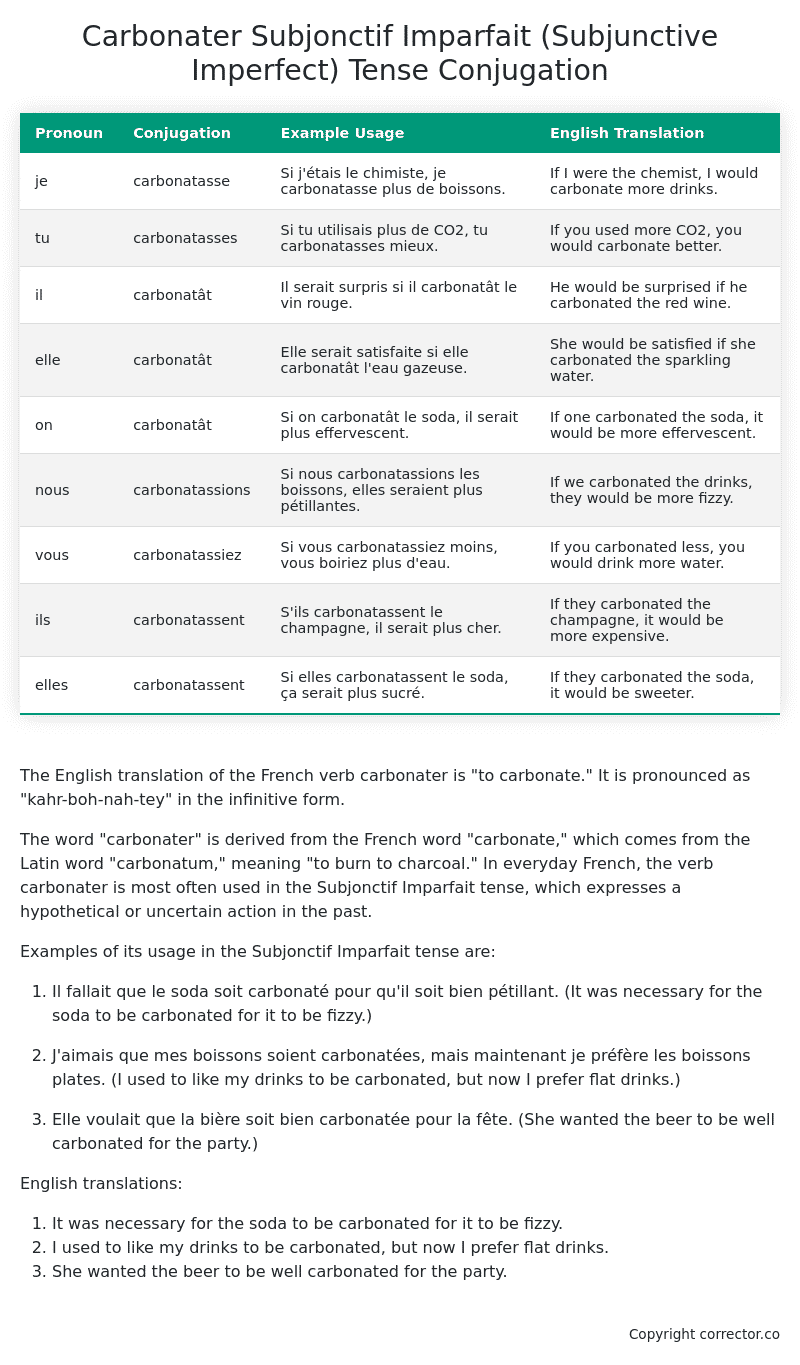Subjonctif Imparfait (Subjunctive Imperfect) Tense Conjugation of the French Verb carbonater
Introduction to the verb carbonater
The English translation of the French verb carbonater is “to carbonate.” It is pronounced as “kahr-boh-nah-tey” in the infinitive form.
The word “carbonater” is derived from the French word “carbonate,” which comes from the Latin word “carbonatum,” meaning “to burn to charcoal.” In everyday French, the verb carbonater is most often used in the Subjonctif Imparfait tense, which expresses a hypothetical or uncertain action in the past.
Examples of its usage in the Subjonctif Imparfait tense are:
-
Il fallait que le soda soit carbonaté pour qu’il soit bien pétillant. (It was necessary for the soda to be carbonated for it to be fizzy.)
-
J’aimais que mes boissons soient carbonatées, mais maintenant je préfère les boissons plates. (I used to like my drinks to be carbonated, but now I prefer flat drinks.)
-
Elle voulait que la bière soit bien carbonatée pour la fête. (She wanted the beer to be well carbonated for the party.)
English translations:
- It was necessary for the soda to be carbonated for it to be fizzy.
- I used to like my drinks to be carbonated, but now I prefer flat drinks.
- She wanted the beer to be well carbonated for the party.
Table of the Subjonctif Imparfait (Subjunctive Imperfect) Tense Conjugation of carbonater
| Pronoun | Conjugation | Example Usage | English Translation |
|---|---|---|---|
| je | carbonatasse | Si j’étais le chimiste, je carbonatasse plus de boissons. | If I were the chemist, I would carbonate more drinks. |
| tu | carbonatasses | Si tu utilisais plus de CO2, tu carbonatasses mieux. | If you used more CO2, you would carbonate better. |
| il | carbonatât | Il serait surpris si il carbonatât le vin rouge. | He would be surprised if he carbonated the red wine. |
| elle | carbonatât | Elle serait satisfaite si elle carbonatât l’eau gazeuse. | She would be satisfied if she carbonated the sparkling water. |
| on | carbonatât | Si on carbonatât le soda, il serait plus effervescent. | If one carbonated the soda, it would be more effervescent. |
| nous | carbonatassions | Si nous carbonatassions les boissons, elles seraient plus pétillantes. | If we carbonated the drinks, they would be more fizzy. |
| vous | carbonatassiez | Si vous carbonatassiez moins, vous boiriez plus d’eau. | If you carbonated less, you would drink more water. |
| ils | carbonatassent | S’ils carbonatassent le champagne, il serait plus cher. | If they carbonated the champagne, it would be more expensive. |
| elles | carbonatassent | Si elles carbonatassent le soda, ça serait plus sucré. | If they carbonated the soda, it would be sweeter. |
Other Conjugations for Carbonater.
Le Present (Present Tense) Conjugation of the French Verb carbonater
Imparfait (Imperfect) Tense Conjugation of the French Verb carbonater
Passé Simple (Simple Past) Tense Conjugation of the French Verb carbonater
Passé Composé (Present Perfect) Tense Conjugation of the French Verb carbonater
Futur Simple (Simple Future) Tense Conjugation of the French Verb carbonater
Futur Proche (Near Future) Tense Conjugation of the French Verb carbonater
Plus-que-parfait (Pluperfect) Tense Conjugation of the French Verb carbonater
Passé Antérieur (Past Anterior) Tense Conjugation of the French Verb carbonater
Futur Antérieur (Future Anterior) Tense Conjugation of the French Verb carbonater
Subjonctif Présent (Subjunctive Present) Tense Conjugation of the French Verb carbonater
Subjonctif Passé (Subjunctive Past) Tense Conjugation of the French Verb carbonater
Subjonctif Imparfait (Subjunctive Imperfect) Tense Conjugation of the French Verb carbonater (this article)
Subjonctif Plus-que-parfait (Subjunctive Pluperfect) Tense Conjugation of the French Verb carbonater
Conditionnel Présent (Conditional Present) Tense Conjugation of the French Verb carbonater
Conditionnel Passé (Conditional Past) Tense Conjugation of the French Verb carbonater
L’impératif Présent (Imperative Present) Tense Conjugation of the French Verb carbonater
L’infinitif Présent (Infinitive Present) Tense Conjugation of the French Verb carbonater
Struggling with French verbs or the language in general? Why not use our free French Grammar Checker – no registration required!
Get a FREE Download Study Sheet of this Conjugation 🔥
Simply right click the image below, click “save image” and get your free reference for the carbonater Subjonctif Imparfait tense conjugation!

Carbonater – About the French Subjonctif Imparfait (Subjunctive Imperfect) Tense
Formation
Common Everyday Usage Patterns
Interactions with Other Tenses
Subjonctif Présent
Indicatif Passé Composé
Conditional
Conditional Perfect
Summary
I hope you enjoyed this article on the verb carbonater. Still in a learning mood? Check out another TOTALLY random French verb conjugation!


